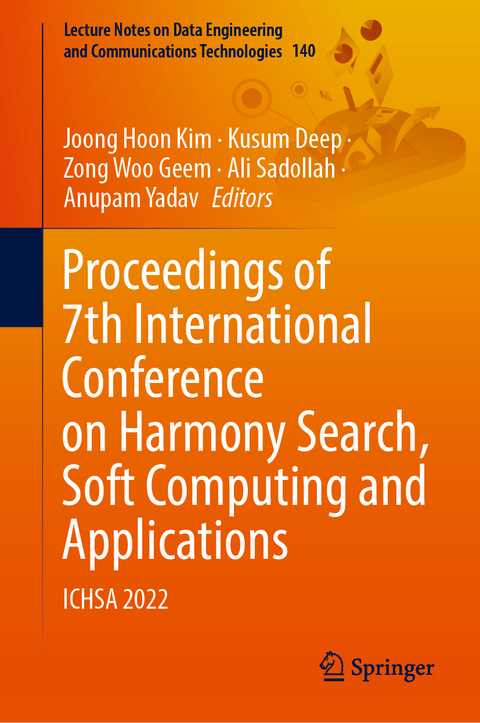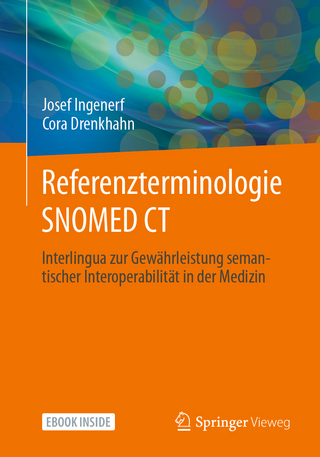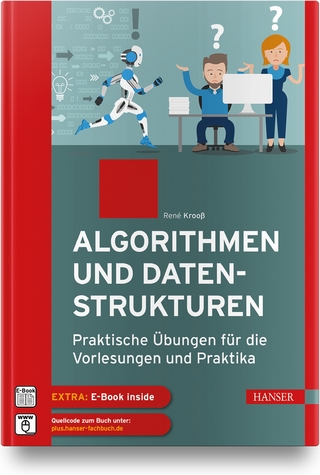
Proceedings of 7th International Conference on Harmony Search, Soft Computing and Applications
Springer Verlag, Singapore
978-981-19-2947-2 (ISBN)
The book covers different aspects of real-world applications of optimization algorithms. It provides insights from the Seventh International Conference on Harmony Search, Soft Computing and Applications held at Virtual Conference, Seoul, South Korea, in February 2022. Harmony search (HS) is one of the most popular metaheuristic algorithms, developed in 2001 by Prof. Joong Hoon Kim and Prof. Zong Woo Geem, that mimics the improvisation process of jazz musicians to seek the best harmony. The book consists of research articles on novel and newly proposed optimization algorithms; the theoretical study of nature-inspired optimization algorithms; numerically established results of nature-inspired optimization algorithms; and real-world applications of optimization algorithms and synthetic benchmarking of optimization algorithms.
Professor Kim, dean of Engineering College of Korea University, obtained his Ph.D. degree from the University of Texas at Austin in 1992 with the thesis title “Optimal replacement/rehabilitation model for water distribution systems”. Prof. Kim’s major areas of interest include: optimal design and management of water distribution systems, application of optimization techniques to various engineering problems, and development and application of evolutionary algorithms. He has been the faculty of School of Civil, Environmental and Architectural Engineering at Korea University since 1993 and is now serving as the dean of Engineering College. He has hosted international conferences including APHW 2013, ICHSA 2014 and 2015, and HIC 2016 and has given keynote speeches at many international conferences including AOGS 2013, GCIS 2013, SocPros 2014 and 2015, SWGIC 2017, and RTORS 2017. He is a member of National Academy of Engineering of Korea since 2017. Dr.Kusum Deep, is a full Professor (HAG), with the Department of Mathematics as well as Joint Faculty at the Centre for Artificial Intelligence and Data Science at the Indian Institute of Technology Roorkee, India. Also, she is a visiting professor, Liverpool Hope University, UK, University of Technology Sydney, Australia, and University of Wollongong, Australia. With B.Sc. Hons and M.Sc. Hons. School from Centre for Advanced Studies, Panjab University, Chandigarh, she is an M.Phil. Gold Medalist. She earned her Ph.D. from UOR (now IIT Roorkee) in 1988. She has been a national scholarship holder and a postdoctoral from Loughborough University, UK, assisted by International Bursary funded by Commission of European Communities, Brussels. She has won numerous awards like Khosla Research Award, UGC Career Award, Starred Performer of IITR Faculty, best paper awards by Railway Bulletin of Indian Railways, special facilitation in memory of late Prof. M. C. Puri, AIAP Excellence Award. Recently,she was one of the four women from IIT Roorkee to feature in the ebook “Women in STEM-2021” celebrating the contributions made by 50 Indian women in STEM published by Confederation of Indian Industries. She has authored two books, supervised 20 Ph.Ds. and published 125 research papers. She is a Senior Member of ORSI, CSI, IMS, and ISIM. She is the executive editor of International Journal of Swarm Intelligence, Inderscience. She is associate editor of Swarm and Evolutionary Algorithms, Elsevier, and is on the editorial board of many journals. She is the founder president of Soft Computing Research Society, India. She is the general chair of series of International Conference on Soft Computing for Problems Solving (SocProS). She has a vast teaching experience in Mathematics, Operations Research, Numerical and Analytical Optimization, Parallel Computing, Computer Programming, Numerical Methods, etc. Her research interests are nature-inspired optimization techniques, particularly Evolutionary Algorithms, and Swarm Intelligence Techniques and their applications to solve real-life problems. Zong Woo Geem is a faculty of IT Convergence College at Gachon University, South Korea. He has obtained B.Eng. in Chung-Ang University, Ph.D. in Korea University, and M.Sc. in Johns Hopkins University and researched at Virginia Tech, University of Maryland-College Park, and Johns Hopkins University. He invented a music-inspired optimization algorithm, harmony search, which has been applied to various scientific and engineering problems. His research interest includes phenomenon-mimicking algorithms and their applications to energy, environment, and water fields. He has served as an editor/editorial board for various journals including Engineering Optimization, Swarm Evolutionary Computation, Int. Journal of Bio-Inspired Computation, Journal of Applied Mathematics, Applied Sciences, Complexity, and Sustainability. Dr. Ali Sadollahreceived his B.S. degree in mechanical engineering, solid states, from Azad University, Semnan Branch, Iran in 2007. He received his M.S. degree in mechanical engineering, applied mechanics, from Semnan University, Semnan, Iran in 2010. He obtained his Ph.D. at the faculty of mechanical engineering, University of Malaya, Kuala Lumpur, Malaysia in 2013. Also, since 2014, he served as a postdoctoral research fellow for more than 2 years at Korea University, Seoul, South Korea. In 2016 for a year, he served as a research staff at Nanyang Technological University, Singapore. Afterwards, he was a guest assistant professor at the Sharif University of Technology, Tehran, Iran. Currently, he is an assistant professor at the department of mechanical engineering at the University of Science and Culture, Tehran, Iran. His research interests include algorithm development, engineering optimization, metaheuristics, applications of soft computing methods in engineering, artificial neural networks, and computational solid mechanics. Dr. Anupam Yadav, assistant professor, Department of Mathematics, Dr. BR Ambedkar National Institute of Technology Jalandhar, India. His research area includes numerical optimization, soft computing, and artificial intelligence, and he has more than ten years of research experience in the areas of soft computing and optimization. Dr. Yadav has done a Ph.D. in soft computing from the Indian Institute of Technology Roorkee, and he had worked as a research professor at Korea University. He has published more than twenty-five research articles in journals of international repute and has published more than fifteen research articles in conference proceedings. Dr. Yadav has authored a textbook entitled “An introduction to neural network methods for differential equations”. He has edited three books which are published by AISC, Springer Series. Dr. Yadav was the general chair, convener, and member of the steering committee of severalinternational conferences. He is a member of various research societies.
COVID-19 Chest X-rays Classification through The Fusion of Deep Transfer Learning and Machine Learning Methods.- Quantitative and Qualitative Analysis of Harmony Search Algorithm in Geomechanics and its Applications.- The Robustness of Tuned Liquid Dampers Optimized via Metaheuristic Methods.- Hybrid Generalized Normal Distribution Optimization with Sine Cosine Algorithm for Global Optimization.- Sensivity analysis on Structural Optimization using Jaya Algorithm.- Upgrading urban drainage systems for extreme rainfall events using multi-objective optimization: Case study of Tan Hoa-Lo Gom drainage catchment, HCMC, Vietnam.- Comparative Study on Optimization of Cantilever Retaining Walls via Several Metaheuristics.- Optimal Solving of Uninhabited Combat Air Vehicle Path Planning Using Neural Network Algorithm.- Cost Optimization and Comparison of Rectangular Cross-Section Reinforced Concrete Beams Using TS500, Eurocode 2 and ACI 318 code.- Training Neural Networks with Lévy Flight Distribution Algorithm.- Pressure Management in Water Distribution Networks Using Optimal Locating and Operating of Pressure Reducing Valves.- The Optimal Location and Dimensions of Flood Control Detention Dams at Kan River Basin, Tehran, Iran.- Minimization the CO2 Emission for Optimum Design of T-Shape Reinforced Concrete (RC) Beam.- Prediction of Minimum CO2 Emission for Rectangular Shape Reinforced Concrete (RC) Beam.- A generative adversarial approach for detecting malware in Android applications using Deep learning.
| Erscheinungsdatum | 05.09.2022 |
|---|---|
| Reihe/Serie | Lecture Notes on Data Engineering and Communications Technologies ; 140 |
| Zusatzinfo | 124 Illustrations, color; 38 Illustrations, black and white; XV, 522 p. 162 illus., 124 illus. in color. |
| Verlagsort | Singapore |
| Sprache | englisch |
| Maße | 155 x 235 mm |
| Themenwelt | Informatik ► Theorie / Studium ► Algorithmen |
| Informatik ► Theorie / Studium ► Künstliche Intelligenz / Robotik | |
| Mathematik / Informatik ► Mathematik ► Analysis | |
| Technik | |
| ISBN-10 | 981-19-2947-5 / 9811929475 |
| ISBN-13 | 978-981-19-2947-2 / 9789811929472 |
| Zustand | Neuware |
| Haben Sie eine Frage zum Produkt? |
aus dem Bereich


